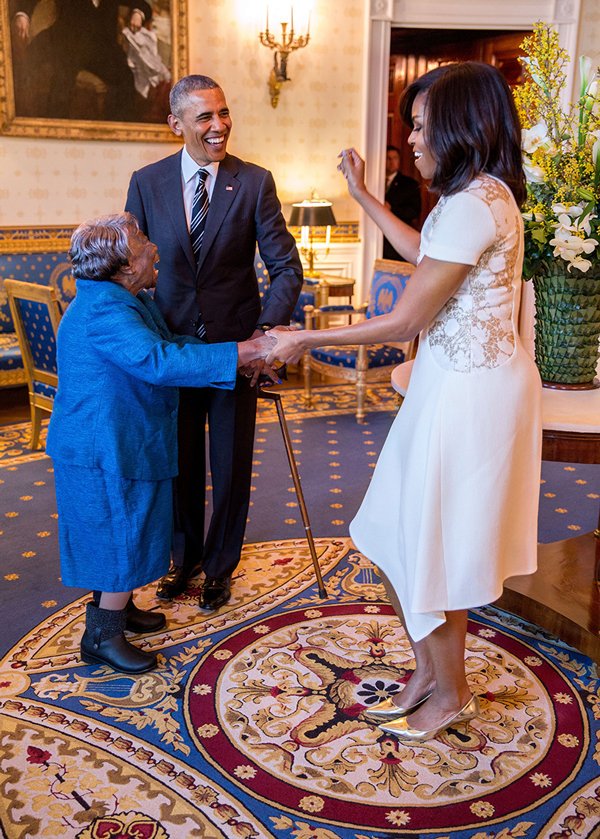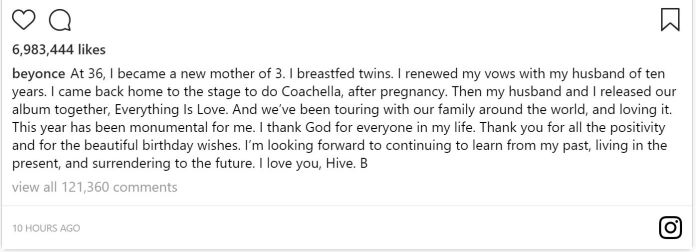I recently penned an article for Ebony magazine celebrating Michelle Obama’s service as the First Lady of the United States. Below is the article in its entirety as well as the link: Thank You, First Lady Michelle Obama

As his historic presidency draws to a close, there’s much to reflect on the legacy of President Obama. And just as importantly, there’s much to reflect on the legacy of First Lady Michelle Obama. In her sista-friend interview with Oprah Winfrey at the recent United State of Women summit, Mrs. Obama looked back on her journey to the White House and how she initially approached her future role as First Lady of the United States: “I specifically did not read other First Ladies’ books, because I didn’t want to be influenced by how they defined the role,” she said. “I knew that I would have to find this role very uniquely and specifically to me and who I was.”
Sage advice that, unfortunately, prospective FLOTUS-in-training Melania Trump failed to heed. Mrs. Trump, who made her long awaited public debut Monday night at the Republican National Convention, delivered a riveting speech that thrilled the packed arena of “Make America Great Again” supporters. Motivating statements such as, “We want our children in this nation to know that the only limit to your achievements is the strength of your dreams and your willingness to work for them,” prompted the crowd to erupt in cheers. Many likely thinking, finally, a First Lady who genuinely cares about the future of America; something that could never be said of Michelle Obama.
Oh, but it could. In fact, at the 2008 Democratic National Convention, Mrs. Obama practically gave the same speech. A speech that she more than lived up to in her eight years of service to this country. Sadly, no one told Mrs. Trump that you can plagiarize words but not the genuine sentiments behind them.
Mrs. Obama, as a person and as First Lady, resonates with many because of her authenticity. This has been echoed in countless conversations I’ve had with others over the last eight years and the recent formal survey of about 60 Black women across the country. As 34-year-old Michelle J., of Austin, TX stated, “She was open about her real life experiences in a world of politics where everyone pretends that their lives are without flaws.”
The survey gave voice to women ranging in age from 20s to 60s, and with educational attainment of high school diploma/GED to PhD. With such vast differences in demographics, it was interesting to see the trends that emerged: optimism, relatability, and “realness.”
When asked to rate (on a scale of ‘strongly disagree’ to ‘strongly agree’) various statements about the First Lady and why they relate to her, the following were the most consistently agreed or strongly agreed upon:
· 88% said she has made them (more) optimistic about the future of Black/African-American women.
· 82% said that because of her, other races/nationalities perceive Black/African-American women in a more favorable light.
They relate to her because:
· 92% – she’s Black.
· 96% – she’s stylish.
· 98% – she’s no-nonsense.
· 98% – she’s not afraid to speak her mind.
· 98% – she can go from the White House to a cookout and not miss a step.
· 96% – in her they see all the things that are possible for themselves.
· 96% – in her they see all the things that are possible for Black/African-American girls and teens.
· 90% – in her they see all the things that are possible for Black/African-American women.
In the words of 37-year-old Nikki F. from Chicago, Il (Mrs. Obama’s hometown), “She represents everything our [Black girls] parents taught us that we could be.”
It’s not easy being the first, however. It’s harder still to be the first in a role that you wouldn’t have chosen for yourself. As the First Lady has stated, “When Barack was talking about running, I was like, are you crazy? I mean, would you just, like, chill out and do something else with your life?” Clearly, the woman was not clamoring for the limelight. Given the choice, she would have lived a fulfilling life tirelessly working to encourage and bring attention to the need for all Americans – especially our youth – to dedicate time to volunteerism and public service.
Thankfully for us, she changed her mind and joined her husband in bringing a “change we can believe in” dream to America. So, in 2009, when her husband was sworn in as the country’s 44th President, we welcomed her with open arms because she presented her authentic self. And because of the connection to her authenticity, we invited her to make us proud; she did not disappoint.
As the first and only (and if we’re being realistic – likely last . . . for a very long time) Black woman to hold this post, Mrs. Obama has exemplified excellence both in words and action. While many love her, there’s a special kinship most Black women feel toward her. It’s not just because she looks like us (although it’s clearly a meaningful fact, according to the survey); it goes so much deeper than that. It’s that she’s made no apologies for the fact that we matter to her. An anomaly in a country where being Black and female has historically meant being discounted, marginalized, and defeated.
As recently as the 2015 Black Women in the United States report, statistics show that the current state of Black American women remain grim:
· Women’s unemployment fell to a six-year low (4.9%) and white women’s unemployment hit a seven-year low (4.2%). Completely counter to that trend, Black women’s unemployment actually ticked up, reaching 8.9%.
· Black women with Bachelor’s degrees, on average, earn about $10,000 less than White men with an Associate’s degree ($49,882 vs. $59,014). In fact, it would take nearly two Black women college graduates to earn what the average White male college graduate earns by himself ($55,804 vs. $100, 620).
· In spite of consistently leading all women in labor market participation, Black women are among the most likely in America to be poor. In fact, the poverty rate of Black women (25.1%) more than doubles that of White women (10.3%) and Asian women (11.5%), and slightly eclipses that of Latinas (24.8%).
In the face of harsh statistics and the personal challenges experienced by Black women, is it any wonder that we “beam with pride” for one who encourages her daughters, mentees, and other women of color “not to live by the limited box and definition that we are put in.” Because she knows that expectations for Black girls – whether they grow up on Chicago’s South Side or in a remote village in Nigeria – are limited, Mrs. Obama created initiatives such as “Let Girls Learn” to provide educational opportunities that change lives.

During her tenure, Mrs. Obama has shown a willingness to leveraged her platform of power and influence to make it possible to aim and achieve our potential, which is why we say thank you.
Below are sample voices of Black women sharing the importance of the First Lady to them:
“She represents everything I can be that the world doesn’t want me to be.” – Lauren W., 27, New Orleans, La
“Michelle matters to me because she breaks the stereotypical views of African-American women in not only America but the world! For 8 years, she has held the position of First Lady, while also wearing so many other hats – a mother, a wife, a daughter, a friend, a philanthropist, an educator and so much more. She’s held her composure at all times with poise, class and humility. She’s addressed issues that most women in her position wouldn’t or know how to. It makes me proud to say the First Lady of America is Michelle Obama, an African American woman.” – Anon, 28, Valley Stream, NY
“First Lady Michelle Obama matters to me because she is great role model for me as an African American woman but also just as a person in general. My being young may have something to do with it, but I’ve never known a First Lady who was so involved issues that are affecting our youth and that inspires me to do more for my community. I also look up to her for her poise and natural confidence. Unlike a lot of celebrities, Michelle Obama provides a healthy and attainable example of what hard work can accomplish.” – Anon, 29
“Michelle Obama matters to me because she has proven to be everything that I expected her to be. She is a woman of stature, grace, beauty, brains and a mother. She has shown that she isn’t just a First Lady, she is an everyday woman who we of all ages can look up to and strive to be more like.” – Kimberley T., 29, Bronx, NY
“Because she is the perfect example of a Black woman. We are not only what the media and society portrays (uneducated, loud, ratchet) she is someone that i can point out to my
daughter to inspire to one day be.” – Tanaya G., 33, Cleveland, OH
“Michelle Obama matters to me because of her intersections: Black woman, mother, lawyer, advocate, wife. She is also sensitive, outspoken, loving and unafraid to me vulnerable.” – Erica C., 34, Queens, NY
“The First Lady matters to me in so many ways. The strongest strength I draw from her though is her ability to pull through authenticity and genuineness and whatever she does. Often African-American women are put in tough, precarious even soul sucking positions to grow professionally. Watching Mrs. Obama deal with the ridicule while staying true to who she is has taught me so much about how I can also do the same and still feel good about myself.” – Allison R., 34, New York, NY
“Because she gets it. The experience of a Black woman in America. I don’t know if anyone with that level of power and access to power in the US has ever understood that experience.” – Rachel H., 34, New York, NY
“The FLOTUS matters to me because I admire her strength in a position where she has constantly been criticized, belittled, and stereotyped. Never, not even for one second, has she stumbled or lost her composure. She has remained the classy, sophisticated, honest, and down to earth woman who stepped onto the campaign trail so many years ago. As we well know, beside every great man is an equally great woman and First Lady Obama has been a shining example of what black excellence looks like. I beam with pride when I see her. She makes me feel like so many things are possible that I once wasn’t sure were. She’s a hope and a dream set to a smooth beat.” – Shamela B., 36, Tupelo, MS
“Simply put: she represents hope.” – Kimberly T., 39, Indianapolis, IN
“She is a role model that our daughters can actually relate to. My worry is not so much for my peers as it is for our future young leaders. I am the mother to one teenage daughter and aunt to 8 young girls. As Black women we need more than a village to prepare our young women for their futures.” – Elita Celeste H, 41, Bronx, NY
“FLOTUS means a great deal to me because she showed how elegant and sophisticated one can be without coming from a pedigree background. She did it her way! She did not conform to any set of rules or standards but presented a new level of exceptional quality that will be very hard for the next First Lady to achieve. FLOTUS is my SHERO!!” – Alfreda M., 45, Dallas, TX
“Michelle has dispelled the media’s portrayal of the Black woman as being uneducated, jobless, hopeless, worthless, baby-mommas that mooch off of the government and give birth to criminals and gangster rappers.” – Lee H.
“First Lady Michelle Obama matters to me because she represents all of what any and all African American women can be. She breaks down many stereotypes and proves what can happen when one gets a good education and does not settle for just what one is given; she strives for better. She proves if we as African American women/girls put our minds to it, we can do and be anything we want. She also matters to me because she is not content with her own successes. She does her best to help other be successful as well.” – Katrina
“She defies the stereotype that Black women cannot articulate a thought or plan of action. Her actions are selfless and demonstrate a passionate desire for the children in our nation to have a great future that is limitless.” – Amika K.
It’s a powerful reflection of her legacy to see the many women she’s encouraged and motivated to hope and work for a better future for themselves and the teens and girls coming behind them. So, thank you, Mrs. Obama, for connecting with us in a way that no other First Lady ever has before (or likely ever will).














